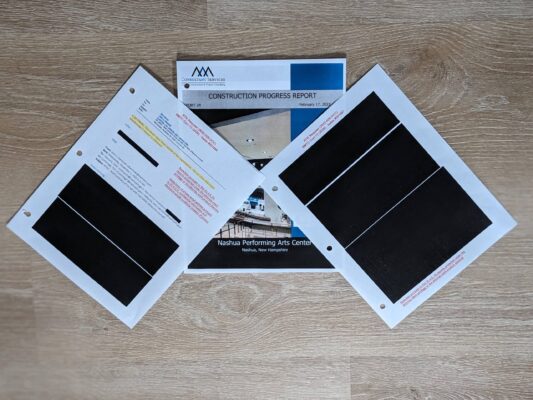On Monday, April 22, 2024, I attended a status conference at the Nashua Superior Court for citizens petitioning the Court to review the City’s redactions on emails associated with the construction of the Art Center.
These emails, crucial to understanding the transaction to use federal money for the project, were heavily redacted and shrouded in secrecy. The City’s actions have effectively transformed our public project into a private one, with over $34M of public spending going to a private corporation, all with no accountability to taxpayers.
The status conference was brief, about 20 minutes, and the citizen representing two plaintiffs, one of whom was away on travel, read from a scripted write-up. Public speaking is difficult for this citizen, and she was uncomfortable before the court, but she’s a great behind-the-scenes researcher and data digger in city finances.
The City has pitted a team of four attorneys against these two self-represented litigants, a David and Goliath scenario that underscores the uphill battle these individuals face. It is disheartening to witness how cases involving public records in Nashua, which should be straightforward, become entangled in complexity. The Court’s convoluted and cumbersome process seems to perpetuate a lack of equity and impartiality and a denial of our constitutional rights to an open, accessible, accountable, and responsive government.
The story behind these redacted emails requires another article to explain the intensity with which the City has worked to keep these records from a judicial review.
A challenge for self-represented parties going to court with the City is that these people often need money and time to challenge the system. This is the case with these ladies. The citizen’s presentation to the Court was funny. When the judge asked her if she wanted discovery (this is permitted in some cases where a person sends formal written questions or conducts transcribed interviews of witnesses), she responded she would like to pose questions to the City but that she could not afford the cost of depositions. She then advanced her remarks by stating that she had attended Ortolano’s hearing for six days regarding Right to Know challenges on the downtown barriers, the Tax Incremental Finance Advisory Board, and the Art Center and that when Ortolano put the city expert employees on the stand most of them responded with I can’t remember, could you repeat the question, and I don’t know? The citizen explained to the judge it didn’t appear that it would be productive to pay the cost of depositions to hear those types of answers all over again. Smart.
When the Court asked Attorney Bolton how much time he would need for the case and how he would handle discovery, his response was equally humorous. He told the Court he couldn’t determine how much time it would take to discuss these redacted emails and the crime-fraud exception being employed by the citizens. He stated, in a very shocked and bewildered look, that he could hardly believe that we had just completed a Right-to-Know trial with a citizen that took six days of testimony to complete!
It should have been easily understandable, as Attorney Bolton and Mr. Hilliard had clearly counseled the City employees to be evasive and unresponsive. Testimony riddled with: “I don’t know.” “ Can you repeat the question?” “What are you referring to?”, etc. The City witnesses were hostile. This made the Trial more difficult and time-consuming, especially for a non-lawyer. I could never get to the truth in court when the City is the Defendant.
Attorneys need to have good memories and recall to advance their lawsuit interests. Attorney Bolton appeared to have a memory lapse, forgetting that the City’s case structuring order submitted to the Court for this Right to Know Petition requested a 3-day trial to be held in February of 2024. The City’s initial verbal request was for a six-day trial. The trial took six days and ended on April 12, 2024. The City got precisely what they asked for. My initial case structuring request was for a 2-day trial in May 2023.
The inefficiencies in the Judicial/legal system are staggering. It seems to favor those with taxpayers’ resources and legal expertise, leaving self-represented litigants like these ladies at a significant disadvantage. Attorney Bolton, who had the upper hand throughout the process, is expressing discontent. But in reality, he got exactly what he wanted. We now await the outcome of a Court Order, a process that could have been much more streamlined and efficient had the City been more transparent and open with citizens.
Should accessing public records in Nashua be so difficult and costly? The City is in command and control of this process but is rigid and unyielding. Transparency and truth go hand-in-hand but the City wants no part of that.
